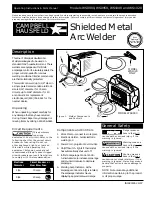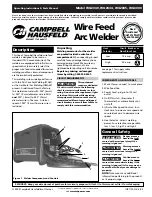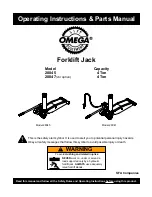
OM-237 974 Page 3
1-3. Additional Symbols For Installation, Operation, And Maintenance
HOT PARTS can burn.
D
Do not touch hot parts bare handed.
D
Allow cooling period before working on
equipment.
D
To handle hot parts, use proper tools and/or
wear heavy, insulated welding gloves and
clothing to prevent burns.
MOVING PARTS can injure.
D
Keep away from moving parts such as fans.
D
Keep all doors, panels, covers, and guards
closed and securely in place.
D
Have only qualified persons remove doors, panels, covers, or
guards for maintenance and troubleshooting as necessary.
D
Reinstall doors, panels, covers, or guards when maintenance is
finished and before reconnecting input power.
READ INSTRUCTIONS.
D
Read and follow all labels and the Owner’s
Manual carefully before installing, operating, or
servicing unit. Read the safety information at
the beginning of the manual and in each
section.
D
Use only genuine replacement parts from the manufacturer.
D
Perform maintenance and service according to the Owner’s
Manuals, industry standards, and national, state, and local
codes.
FLYING METAL or DIRT can injure eyes.
D
Wear safety glasses with side shields or wear
face shield.
ELECTRIC AND MAGNETIC FIELDS (EMF)
can affect Implanted Medical Devices.
D
Wearers of Pacemakers and other Implanted
Medical Devices should keep away.
D
Implanted Medical Device wearers should consult their doctor
and the device manufacturer before going near arc welding, spot
welding, gouging, plasma arc cutting, or induction heating
operations.
OVERUSE can cause OVERHEATING.
D
Allow cooling period; follow rated duty cycle.
D
Reduce amperage (thickness) or reduce duty
cycle before starting to cut again.
EXPLODING HYDROGEN hazard.
D
When cutting aluminum underwater or with the
water touching the underside of the aluminum,
free hydrogen gas may collect under the work-
piece.
D
See your cutting engineer and water table instructions for help.
FALLING EQUIPMENT can injure.
D
Use lifting eye to lift unit only, NOT running
gear, gas cylinders, or any other accessories.
D
Use equipment of adequate capacity to lift unit.
D
If using lift forks to move unit, be sure forks are long enough to ex-
tend beyond opposite side of unit.
D
Keep equipment (cables and cords) away from moving vehicles
when working from an aerial location.
D
Follow the guidelines in the Applications Manual for the Revised
NIOSH Lifting Equation (Publication No. 94
−
110) when manually
lifting heavy parts or equipment.
FIRE OR EXPLOSION hazard.
D
Do not locate unit on, over, or near combustible
surfaces.
D
Do not install unit near flammables.
D
Do not overload building wiring
−
be sure power supply system is
properly sized, rated, and protected to handle this unit.
STATIC (ESD) can damage PC boards.
D
Put on grounded wrist strap BEFORE handling
boards or parts.
D
Use proper static-proof bags and boxes to
store, move, or ship PC boards.
H.F. RADIATION can cause interference.
D
High frequency (H.F.) can interfere with radio
navigation, safety services, computers, and
communications equipment.
D
Have only qualified persons familiar with elec-
tronic equipment perform this installation.
D
The user is responsible for having a qualified electrician promptly
correct any interference problem resulting from the installation.
D
If notified by the FCC about interference, stop using the equipment
at once.
D
Have the installation regularly checked and maintained.
D
Keep high-frequency source doors and panels tightly shut, keep
spark gaps at correct setting, and use grounding and shielding to
minimize the possibility of interference.
ARC CUTTING can cause interference.
D
Electromagnetic energy can interfere with
sensitive electronic equipment such as
computers and computer-driven equipment
such as robots.
D
To reduce possible interference, keep cables as short as possible,
close together, and down low, such as on the floor.
D
Locate cutting operation 100 meters from any sensitive electronic
equipment.
D
Be sure this cutting power source is installed and grounded
according to this manual.
D
If interference still occurs, the user must take extra measures such
as moving the machine, using shielded cables, using line filters, or
shielding the work area.
Summary of Contents for ICE-40T
Page 4: ......
Page 35: ...OM 237 974 Page 31 Notes...
Page 36: ...OM 237 974 Page 32 SECTION 7 ELECTRICAL DIAGRAM Figure 7 1 Circuit Diagram...
Page 37: ...OM 237 974 Page 33 235 080 A...
Page 40: ...Notes...
Page 41: ...Notes...
Page 42: ...Notes...








































